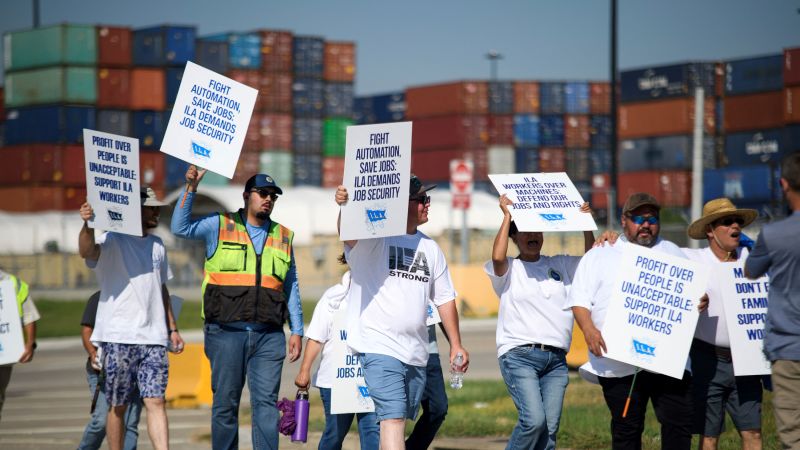Members of the International Longshoremen’s Association are set to return to work at ports on Friday, following a tentative deal reached on wages with the management group representing shipping lines, terminal operators, and port authorities. While a final agreement has not been reached on the complete contract, the two sides have agreed to extend the contract until January 15 and have union members back on the job while details are finalized and the agreement is ratified by the rank-and-file.
The 50,000 union members have been on strike since early Tuesday, impacting the flow of containerized imports and exports at ports from Maine to Texas. A tentative deal would still need ratification by ILA members, but workers are set to return on Friday to prevent further disruptions to the US economy. However, there is a possibility that the strike could resume if members vote against the deal, as seen in past labor negotiations such as the IAM and Boeing deal that was rejected by union members last month.
The ongoing port strike threatened the US economy, with ships unable to unload and load goods at US ports leading to potential shortages of various products heading into the busy holiday shopping season. Business groups have been urging the Biden administration to order strikers back to work to prevent disruptions and potential price increases caused by supply chain interruptions. The impact of the strike has the potential to extend beyond the immediate term, highlighting the significance of reaching a resolution and ensuring stability in the port operations.
The strike’s potential effects on businesses, both domestically and internationally, underscore the importance of negotiating and ratifying a final agreement to avoid further disruptions in the supply chain. The uncertainty surrounding the strike and its implications for the economy have prompted calls for swift action to resolve the situation and prevent adverse consequences for businesses and consumers. Given the importance of the ports in facilitating trade and commerce, efforts to reach an agreement and ensure smooth port operations are crucial to maintaining economic stability.
The progress towards a tentative deal and the return of union members to work signify a step towards resolving the strike and preventing further disruptions in port operations. The extension of the contract until January 15 provides time for finalizing details and ratification by the rank-and-file members, offering a temporary solution to the labor negotiations. As the situation continues to develop, updates on the agreement, ratification process, and the impact on port operations will be essential in understanding the implications for the US economy and businesses relying on the ports for imports and exports.
In conclusion, the tentative deal reached between the International Longshoremen’s Association and the management group representing shipping lines, terminal operators, and port authorities offers a temporary resolution to the ongoing strike affecting US ports. The return of union members to work on Friday indicates progress towards reaching a final agreement and preventing further disruptions in the supply chain. As negotiations continue and the agreement is ratified, monitoring the impact on businesses and the economy will be crucial in understanding the implications of the strike and ensuring stability in port operations moving forward.


